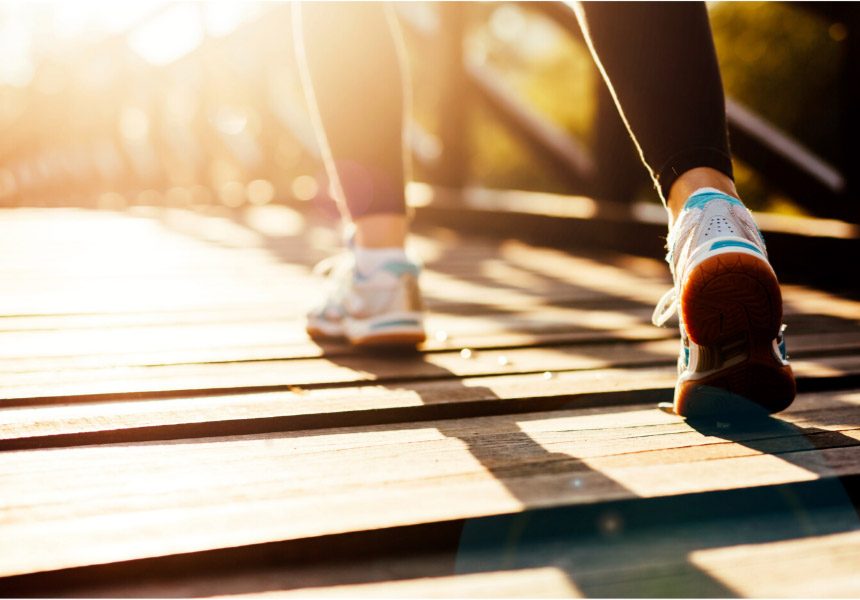
Exercise has long been understood as a modulator for our health, but what if exercise was also able to promote a healthy gut microbiome? Today we are going to address the many benefits of exercise on our health, as well as its role in promoting a diverse and healthy gut! Our gut health is influenced by many intrinsic and extrinsic factors. A few common factors that we commonly associate with our gut health include our diets, mode of delivery, medications, genetics, age, diseases and stress. Diet and its effects on the gut microbiome has been a primary focus of countless studies due to its simple, yet effective ability to modify our gut’s microbial composition. Likewise, recent studies are beginning to show that, like our diets, regular exercise and physical activity can also modify our microbiota composition by enhancing the number of beneficial microbes, increasing diversity, and improving the development of commensal bacteria.
The relationship between our health and gut flora is unquestionably linked. This relationship becomes even more apparent when observing the close association between gut dysbiosis and the countless non-communicable (chronic) diseases prevalent in our society today, such as obesity, diabetes, cardiovascular and gastrointestinal diseases, and cancer. Dysbiosis is characterized by microbial imbalances between the gut microbiota and its host, and can influence gut permeability, systemic inflammation, anabolism and nutrient availability. It is associated with reduced microbial diversity and the growth of pathogenic bacteria. A healthy microbiome maintains high bacterial diversity and has a positive balance between pathogenic and commensal microbes. The higher our microbial diversity, the better our microbiota can undertake stable metabolic, immunological and gut protective functions!
Interestingly, sedentary lifestyles and behaviors have been associated with dysbiosis and chronic diseases. Physical inactivity is becoming one of the leading risk factors globally for chronic disorders such as cardiovascular disease, obesity, type 2 diabetes, cancer, hypertension, and metabolic syndromes, anxiety and depression. Comprehensive evidence has established that lack of physical activity affects almost every cell, organ, and system in the body and ultimately leads to an increase in morbidity, as well as early mortality; moreover, physical inactivity alone is sufficient to increase chronic disease. The sedentary lifestyle is a major contributing factor to morbidity, especially in our developed Western society. Essentially, we have engineered most physical activity out of our daily lives with modern advances such as transportation, information technology and urbanization. Even though we cherish these things that have made our lives infinitely better, they hinder our physical activity, and consequently our health.

Fortunately for us, we can win this battle against the adverse effects of physical inactivity and combat chronic diseases that are plaguing our modern world! Exercise has been shown to be both a preventative and a treatment tool for many chronic and inflammatory diseases. There are a few key mechanisms that are associated with exercise and its health-promoting effects. Physical exercise promotes anti-inflammatory states by modulating our body’s inflammatory response. This is key because many chronic diseases have been linked to inflammation. Exercise also promotes the hypothalamic–pituitary–adrenal (HPA) axis, which both regulates homeostatic systems in the body and our body’s response to stress and also reinforces neuromuscular function. Exercise also helps with weight loss, increases energy, improves bone and functional health, assists in better sleep and in stronger muscular and cardiorespiratory fitness. The list truly does go on and on, and new benefits of exercise on our health continue to be discovered.
A health benefit that has emerged through various studies is exercise’s ability to regulate our gut microbiome towards a healthy state. Exercise has been shown to increase our microbial diversity, promote a healthy balance between commensal and pathogenic bacteria, and protect against the development of intestinal inflammatory disease, such as IBD and colon diseases, due to its anti-inflammatory effects. The decrease in inflammation as a whole protects the morphology, composition, and integrity of our intestines. Another factor where exercise benefits our gut is exercise’s ability to reduce transient stool time; essentially, this reduces contact time between pathogens and the gastrointestinal mucus layer, thus, reducing the risk of colon cancer, diverticulosis, and inflammatory bowel disease.
Exercise has been shown to increase butyrate-producing bacteria. Butyrate is a metabolite that is produced from bacterial fermentation of dietary fiber. Butyrate’s benefits really have no bounds. It has anti-inflammatory and anti-carcinogenic effects and increases tight-junction protein levels, ultimately promoting the maintenance of the intestinal barrier and reducing mucosal gut permeability. By strengthening the intestinal barrier, butyrate may block the translocation of lipopolysaccharide (LPS)—a potent inflammatory molecule produced in the cell membrane of Gram-negative bacteria. The benefits of butyrate production correspond not only with our gut, but to our overall health due to their anti-inflammatory and anti-carcinogenic effects, as well as their immune-regulatory functions.
Though there are many benefits to exercise, there are instances when exercise acts as an undo stressor for our bodies. During strenuous, chronic and high-intensity exercise, commonly seen in high performance athletes, our body temperature increases and our blood begins to pool away from the GI tract and to our periphery muscles and organs, such as the heart and lungs. This redistribution of blood flow away from the intestines, together with thermal damage to the intestinal mucosa, can cause intestinal barrier disruption, loosening tight junctions, which is followed by an inflammatory response. Additionally, over time, increased stress hormones and lipopolysaccharides (LPS) translocation in the gastrointestinal tract from intensive exercise can trigger immune responses also associated with inflammation and intestinal permeability. These are a few unfortunate realities of strenuous exercise but, fortunately, most of these symptoms are transient and acute, and can be prevented with the appropriate precautions, including diet and supplementation.
The connection between exercise and our health and microbiome is fascinating and studies are beginning to confirm the importance of this connection and the significance of exercise on our overall health. The reality is that we do live in a modern world with countless incredible technological advances that do make our lives better and have greatly improved certain standards of life, however, it has promoted physical inactivity and sedentary lifestyles. It is now more important than ever to include exercise in our lives in order to fight the many negative effects of physical inactivity and sedentary habits. The benefits of exercise truly do outweigh any potential harm and with a countless number of benefits that help increase our overall quality of life!
To optimize your Gut Health, download Dr Mendez Gut Health Guide! If you are looking for support to help improve your diet and boost your gut microbiome, then get in touch today or register to make an appointment to discover how Doctor Méndez can help you to optimize your health.
Post produced with Catherine Shulman.
References
Booth, F. W., Roberts, C. K., & Laye, M. J. (2012). Lack of exercise is a major cause of chronic diseases. Comprehensive Physiology, 2(2), 1143–1211. https://doi.org/10.1002/cphy.c110025
Cerdá, B., Pérez, M., Pérez-Santiago, J. D., Tornero-Aguilera, J. F., González-Soltero, R., & Larrosa, M. (2016). Gut Microbiota Modification: Another Piece in the Puzzle of the Benefits of Physical Exercise in Health?. Frontiers in physiology, 7, 51. https://doi.org/10.3389/fphys.2016.00051
Clark, A., & Mach, N. (2016). Exercise-induced stress behavior, gut-microbiota-brain axis and diet: a systematic review for athletes. Journal of the International Society of Sports Nutrition, 13, 43. https://doi.org/10.1186/s12970-016-0155-6
Cook, M. D., Allen, J. M., Pence, B. D., Wallig, M. A., Gaskins, H. R., White, B. A., & Woods, J. A. (2016). Exercise and gut immune function: evidence of alterations in colon immune cell homeostasis and microbiome characteristics with exercise training. Immunology and cell biology, 94(2), 158–163.
De la Cuesta-Zuluaga, J., Mueller, N. T., Álvarez-Quintero, R., Velásquez-Mejía, E. P., Sierra, J. A., Corrales-Agudelo, V., Carmona, J. A., Abad, J. M., & Escobar, J. S. (2018). Higher Fecal Short-Chain Fatty Acid Levels Are Associated with Gut Microbiome Dysbiosis, Obesity, Hypertension and Cardiometabolic Disease Risk Factors. Nutrients, 11(1), 51. https://doi.org/10.3390/nu11010051
Ercolini, D., & Fogliano, V. (2018). Food Design To Feed the Human Gut Microbiota. Journal of agricultural and food chemistry, 66(15), 3754–3758. https://doi.org/10.1021/acs.jafc.8b00456
Estaki, M., Pither, J., Baumeister, P., Little, J. P., Gill, S. K., Ghosh, S., Ahmadi-Vand, Z., Marsden, K. R., & Gibson, D. L. (2016). Cardiorespiratory fitness as a predictor of intestinal microbial diversity and distinct metagenomic functions. Microbiome, 4(1), 42. https://doi.org/10.1186/s40168-016-0189-7
Gubert, C., Kong, G., Renoir, T., & Hannan, A. J. (2020). Exercise, diet and stress as modulators of gut microbiota: Implications for neurodegenerative diseases. Neurobiology of disease, 134, 104621. https://doi.org/10.1016/j.nbd.2019.104621
Mayo Clinic. (2019). Exercise: 7 benefits of regular physical activity. https://www.mayoclinic.org/healthy-lifestyle/fitness/in-depth/exercise/art-20048389.
McBurney, M. I., Davis, C., Fraser, C. M., Schneeman, B. O., Huttenhower, C., Verbeke, K., Walter, J., & Latulippe, M. E. (2019). Establishing What Constitutes a Healthy Human Gut Microbiome: State of the Science, Regulatory Considerations, and Future Directions. The Journal of nutrition, 149(11), 1882–1895. https://doi.org/10.1093/jn/nxz154
Monda, V., Villano, I., Messina, A., Valenzano, A., Esposito, T., Moscatelli, F., Viggiano, A., Cibelli, G., Chieffi, S., Monda, M., & Messina, G. (2017). Exercise Modifies the Gut Microbiota with Positive Health Effects. Oxidative medicine and cellular longevity, 2017, 3831972.
Peters, H. P., De Vries, W. R., Vanberge-Henegouwen, G. P., & Akkermans, L. M. (2001). Potential benefits and hazards of physical activity and exercise on the gastrointestinal tract. Gut, 48(3), 435–439. https://doi.org/10.1136/gut.48.3.435
Ticinesi, A., Lauretani, F., Tana, C., Nouvenne, A., Ridolo, E., & Meschi, T. (2019). Exercise and immune system as modulators of intestinal microbiome: implications for the gut-muscle axis hypothesis. Exercise immunology review, 25, 84–95.
Williams, B. A., Grant, L. J., Gidley, M. J., & Mikkelsen, D. (2017). Gut Fermentation of Dietary Fibres: Physico-Chemistry of Plant Cell Walls and Implications for Health. International journal of molecular sciences, 18(10), 2203. https://doi.org/10.3390/ijms18102203








